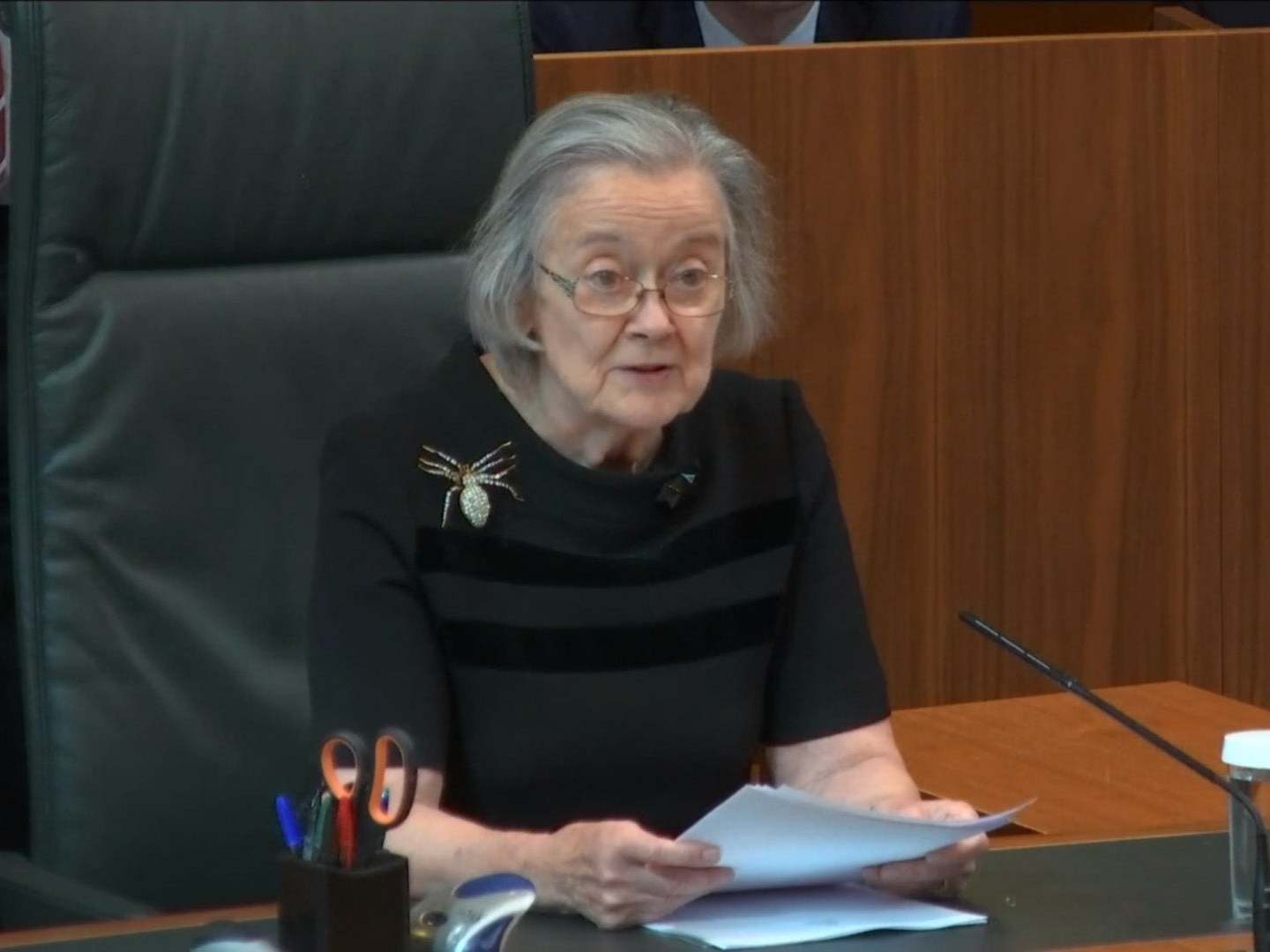Boris Johnson plotting ‘vindictive revenge’ on Supreme Court with plan to overhaul justice system, Labour says
Labour’s Shami Chakrabarti denounces review of legal system as ‘move from the Book of Trump’
Your support helps us to tell the story
From reproductive rights to climate change to Big Tech, The Independent is on the ground when the story is developing. Whether it's investigating the financials of Elon Musk's pro-Trump PAC or producing our latest documentary, 'The A Word', which shines a light on the American women fighting for reproductive rights, we know how important it is to parse out the facts from the messaging.
At such a critical moment in US history, we need reporters on the ground. Your donation allows us to keep sending journalists to speak to both sides of the story.
The Independent is trusted by Americans across the entire political spectrum. And unlike many other quality news outlets, we choose not to lock Americans out of our reporting and analysis with paywalls. We believe quality journalism should be available to everyone, paid for by those who can afford it.
Your support makes all the difference.Boris Johnson has been accused of preparing his revenge on parliament and the courts for hampering his attempts to force through Brexit.
Just days after a general election won on the back of a campaign blaming MPs and unelected judges for blocking the will of the people, Mr Johnson announced plans for reform of the UK’s constitution, democratic institutions and legal system in what he termed “the most radical Queen’s Speech in a generation”.
Emboldened by his landslide 80-seat majority, the prime minister made clear his intention to use his new-found dominance in the House of Commons not only to drive through Brexit on 31 January but to institute reforms that will alter the face of the nation for decades to come.
Little detail was revealed of the remit of two powerful commissions due to produce reports on the constitution and the justice system. But the PM’s plans raised immediate concerns that he may be planning to use his untrammelled parliamentary power to sweep aside obstacles to his ambitions.
Mr Johnson said he would abolish fixed-term parliaments legislation introduced by David Cameron, seizing back for the prime minister the crucial power to set the date of the election at a time calculated to maximise his chances of re-election. And he will press ahead with plans to introduce voter ID and reform postal voting, which critics claim will make it easier for Tories to win elections.
The PM is also expected to press ahead with changes to parliamentary constituency boundaries to make each seat a similar size, though it was not clear whether he would implement Cameron’s plan to slim down the Commons from 650 to 600 MPs.
The prime minister has made no attempt to hide his exasperation at MPs’ use of parliamentary tactics to ensure proper scrutiny of the government’s Brexit plans – in a process he dismissed as “dither and delay”. And he was reportedly furious when the Supreme Court ruled his five-week shutdown of parliament in September unlawful and void.
Responding to news that Mr Johnson had the courts in his sights, shadow attorney general Shami Chakrabarti warned: “This looks like a vindictive revenge for his defeat in the Supreme Court when he shut down parliament illegally.
“It’s another play from the Book of Trump and decent people of all parties and none must resist.”
There were also concerns about undefined reforms to the UK’s democratic institutions, which Mr Johnson said would “restore trust in how our democracy operates”.
The chief executive of the Best for Britain campaign, Naomi Smith, said the plans “should set alarm bells ringing for anyone who believes that parliament must be able to act as a brake on a runaway government”.
Ms Smith said: “We must be hyper-vigilant to any chipping away of the checks and balances that keep our democracy functioning. We have already seen that Johnson is prepared to bend the law to his will – further subversion by stealth cannot be allowed.”
And Green Party MP Caroline Lucas warned: “Judicial independence is critical to our democracy. The prime minister has already fallen foul of the Supreme Court. So I find his proposed constitution, democracy and rights commission very worrying. There must be no attack on our judiciary.”
When hints of the PM’s intention to revamp the court system emerged in the Conservative election manifesto, there were warnings that he was planning to rein in individuals’ ability to use judicial review to restrict the use of executive power.
Outgoing Supreme Court president Lady Hale – who famously ruled against Mr Johnson’s five-week prorogation of parliament while wearing a spider brooch – used her retirement speech on Wednesday to warn Mr Johnson against political appointment of senior judges.
“Judges have not been appointed for party political reasons in this country since at least the Second World War,” said Lady Hale. “We do not want to turn into the Supreme Court of the United States – whether in powers or in process of appointment.”

The legislative programme unveiled by the Queen in a scaled-back state opening ceremony in the House of Lords centred on plans for a constitution, democracy and rights commission to undertake a review of every aspect of the post-Brexit settlement, as well as a separate royal commission on the criminal justice process.
Declaring that the current justice system needs “serious change”, Mr Johnson said the commission will deliver a “fundamental review”, with the goal of ensuring that it “works for the law-abiding majority” and gives a “second chance” to offenders willing to make a fresh start.
It will be the first such shake-up of the system since the Runciman Commission of 1993, which led to the creation of the Criminal Cases Review Commission to investigate allegations of miscarriages of justice.

The government will press ahead with controversial plans for voter ID, despite trials that resulted in 800 people being turned away from polling stations in just 10 areas.
To allay concerns that vulnerable voters will be forced to pay for passports or driving licences in order to vote, Mr Johnson confirmed plans for a free “local electoral identity document” for those without ID.
But the announcement sparked concern from democracy campaigners, with the Electoral Reform Society warning it could leave tens of thousands of voters “voiceless”.
There will be a clampdown on postal voting, following longstanding claims by Tory MPs of abuse of the system, with a new requirement for individuals to renew their registration every three years.
Mr Johnson also set out plans for what he said would be the “deepest” review of security, defence and foreign policy since the end of the Cold War, covering the armed forces, intelligence services and counterterrorism.
The list of 36 bills and draft bills is much expanded on the Queen’s last visit to Westminster in October, when she set out a programme that was almost immediately curtailed by the general election.
The rapid repeat visit meant a reduction in the usual pomp and ceremony, with the monarch travelling from Buckingham Palace by car rather than horse-drawn coach and wearing a hat rather than a crown.
Declaring himself “humbled” by his overwhelming triumph in last week’s election, Mr Johnson promised to work to “repay the trust” of voters, many of whom backed the Tories for the first time.
And he said: “Our ambition is nothing short of a complete transformation of our country for the better.
“We will deliver for the whole of our great Union, investing in and levelling up every part of England, Scotland, Wales and Northern Ireland.
“We will ensure that 2020 is a year of growth and opportunity, bringing together our United Kingdom and moving on from the division and uncertainty of the last three and a half years.”
Subscribe to Independent Premium to bookmark this article
Want to bookmark your favourite articles and stories to read or reference later? Start your Independent Premium subscription today.

Join our commenting forum
Join thought-provoking conversations, follow other Independent readers and see their replies
Comments